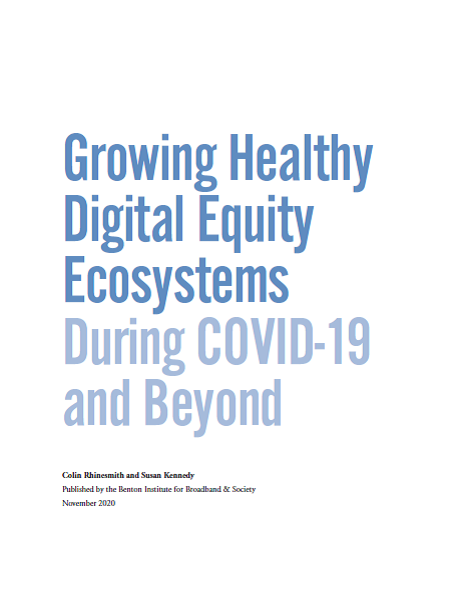Colin Rhinesmith

The Digital Equity Leadership Lab: A Case Study of Community Leadership Development to Promote Digital Equity and Justice
In 2021, twenty-five community leaders from across Baltimore came together with national experts in areas related to network engineering, federal policymaking, community broadband networking, and grassroots organizing for a five-week online program, called “The Digital Equity Leadership Lab (DELL).” DELL was created by Rober
Why Low-Cost Devices Matter for Broadband Policy
On May 12, the Federal Communications Commission launched its Emergency Broadband Benefit Program. The program was included as part of the Consolidated Appropriations Act, 2021, which was passed by Congress and signed into law by President Trump in December 2020 to provide relief during the pandemic.
Measuring Library Broadband Networks Dataverse
Measuring Library Broadband Networks for the National Digital Platform, is a research grant from by the Institute of Museum and Library Services (IMLS) National Leadership Grant for Libraries program (award #LG-71-18-0110-18). The research is led by Dr.
Providing Free and Affordable Broadband for All in Illinois
In order to achieve the goal of universal broadband for everyone in Illinois, broadband must be available and affordable. However, home broadband service is out of reach for many low-income households in Illinois that are unable to afford subscriptions. Therefore, efforts to promote universal broadband should include programs that offer access to affordable broadband service, as well as access to low-cost digital devices and digital literacy training, which have been highlighted as necessary to promote digital inclusion and meaningful broadband adoption.
The Impacts of COVID-19 on Digital Equity Ecosystems
COVID-19 has turned the floodlights on digital inequality in rural, tribal, and urban communities across the United States.
How are digital inclusion coalitions across the country responding to the triple challenges of the pandemic, growing economic inequality, and racial injustice facing poor communities and communities of color across the country without access to broadband internet at home?

While More Americans Rely on Parking Lot Wi-Fi, Many Public Libraries Do Not Have Adequate Broadband
Many digital equity advocates applauded the Federal Communications Commission’s recent clarification explicitly allowing public schools and libraries to let their communities access E-Rate-supported Wi-Fi services while their buildings are closed during the COVID-19 pandemic.
Too uneducated to understand the importance of home Internet?
In their recent Op-Ed in the Washington Post, “Cities, not rural areas, are the real Internet deserts,” authors Blair Levin and Larry Downes argue that the digital divide in cities persists because uneducated people do not understand the importance, or “relevance,” of the internet in their everyday lives.

The Ability to Pay for Broadband
According to recent National Telecommunications and Information Administration (NTIA) survey data, roughly 28 million households in the United States still do not use the Internet at home (Goldberg, 2019). In its survey, the NTIA also asked why households did not use the Internet at home, with 58 percent citing a lack of interest as their main reason for being offline and every fifth household (21%) stating that it is too expensive.

Developing Media Literacy in Public Libraries: Learning from Community Media Centers
The rise of digital media labs and spaces for content creation in public libraries has been documented in the scholarly literature. However, fewer studies have investigated the outcomes of media literacy initiatives in community media centers (CMCs) and how they might inform similar programs and services in public libraries. This article reports findings from a study that used qualitative research to investigate the current goals and activities of CMCs across the United States.

